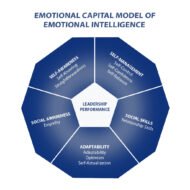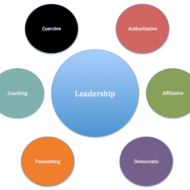Posted by Managementguru in Business Management, Decision Making, Entrepreneurship, Human Resource, Organisational behaviour, Principles of Management
on Mar 20th, 2014 | 0 comments

Emotional Intelligence for Effective Inter Personal Relationships What is Emotional Intelligence : an ability or capacity to perceive, assess, and manage the emotions of one’s self, and of others. Role of Emotions: Emotions play a critical role in organizations where there is a need for people to work in groups or teams. A leader who is strong in mind and thoughtful can perceive, observe and direct the emotions of the team members through proper channels. Such a leader is said to be “emotionally intelligent”. No! It is not about intelligence quotient but emotional intelligence. Empathy is the ultimate quality expected in leaders and managers rather than being rated high in the IQ scale.The capacity to perceive, scrutinize and manage one’s own emotions and that of others is one major factor of advantage in the concept of emotional intelligence. An emotionally intelligent person can institutionalize and manage change as well as make powerful decisions. Grooming of Human Mind and Skills: Human resource management throws up a real challenge to corporate organizations, where human minds and skills have to be groomed for the purpose of transcending their performance to remarkable levels in order to satisfy the production requirements. This is possible only when an organization has a leader who can draft and amalgamate the process of relationship management and skill development without a glitch for the benefit of the organization . Transformational leadership with constructive attitude and open approach is well appreciated and accepted by the worker force. What are the distinct features of emotional intelligence? High perception Being insightful Sensitive to the needs and requirements of the employees Self-control Self-awareness Open communication Empathy Change management skills Effective decision making Ever sanguine Instrumental in developing interpersonal skills Breaks the conventional rules Aggressive and daring in his approach Socially popular and easily gain acceptance Motivation driver The rational quotient behind emotional intelligence helps people to think and act smart even during nerve-racking situations.Emotional intelligence helps people to think and act in a logical manner in stressful situations that can divert their energy into positive thinking. A leader with high emotional intelligence can work efficiently with his team members. The spirit of exuberance from the leader acts as a positive signal and takes the pressure off the employees’ mind. It is this ability to identify and understand the emotions of people working under him makes him a comrade rather than a commando. Why EI is Necessary? Emotional intelligence is necessary for top level executives at management level to stand out and succeed. An ordinary employee who does mundane job everyday is expected to be technically sound and well-trained. The same criterion can never be applied to a manager or a chief executive who is bound to manage both formal and informal teams working under the same roof. Only persons who are emotionally sound can uphold the proceedings with dynamism and verve. By motivating human personnel you can get things done in a smooth manner: Give them a fresh start to prove themselves in case if they fail at the first attempt Anger management of self/others Channelize the emotions of self/others and create positive vibes Perceive the problems from various angles to get a complete picture Understanding the root of the problem Treating work as fun Thinking out of the box – parallel thinking and creative thinking must be encouraged amongst the employee group. People with high emotional intelligence are the ones needed in business community as big corporate organizations always find it difficult to manage human resource. The management has to devise a system that takes into account the intricacies of human mind and assigning right people to handle the perplexities....

Posted by Managementguru in Business Management, Human Resource, Leadership, Principles of Management
on Mar 1st, 2014 | 0 comments

One of the key concepts of leadership is that everyone has innate leadership skills that can be ‘polished’ and developed. In excellent organizations, everyone, regardless of title or position, is encouraged to act like a leader. One of the principles of effective leadership is “to make sure that other people will be willing to follow you. Unfortunately, management education doesn’t place enough emphasis on leadership skills.” The functions of a leader can be defined as follows: 1. Taking the initiative – A leader initiates all actions necessary for the purpose of warranting the health and growth of the enterprise in a competitive economy. 2. He identifies group goals 3. He represents the organization 4. He acts as an arbitrator 5. To assign reasons for his actions 6. To interpret the objectives of organization 7. To guide and direct the organization 8. To encourage team work 9. He manages the organization Top 50 Quotes That Show the Road to Success This exemplary leadership model by kouzes and posner will give you a fair idea on how a leader should set behavioral and performance standards in an organization. Leadership Styles Every leader has his own style that can be defined as a leader‘s behavior towards group members. It refers to the pattern of behavior which a leader embraces in influencing the behavior of his subordinates in the organizational context. Different leadership styles can be categorized as follows. 1. Autocratic Leadership Autocratic leadership is also known as authoritarian, directive, leader centered or monothetic style. Under this style, leader concentrates all authority in himself, instructs a subordinate as to what to do, how to do it, when to do it etc. He also exercises close supervision and control over his subordinates. There are three categories of autocratic leaders a. Strict Autocrat – A strict autocrat believes on negative authority and gives orders which the subordinates must accept. He may also use his powers to disperse rewards to his group. b. Benevolent Autocrat – The benevolent style aids in accomplishing high productivity in many situations and he can develop effective human relationship. His motivational style is usually positive. c. Manipulative Autocrat – A manipulative autocrat leader is one who makes the subordinates feel that they are participating in decision making process even though he has already taken the decisions. 2. Participative Leadership This style is also called as democratic, consultative, group centered or ideographic style. A participative leader is one who consults and welcomes his subordinates to participate in decision making process. Under this style, subordinates are freely allowed to communicate with the leader and also with their fellow subordinates and take their own initiative. 3. Laissez Faire or Free-rein Leadership Under this style of leadership, the leader mostly depends upon the group and its members to establish their own goals and make their own decisions. The leader is passive and assumes the role of just another member in the group. Only very little control is exercised over group members. This style is also known permissive style of leadership. This style is appropriate only in certain situations where the manager can leave a choice to his groups. A leader is supposed to possess these discretionary skills required at different times and during interaction with different people… Qualities of a successful leader The following are the major innate qualities in a successful leader. 1. Physical features like height, weight, health and appearance 2. Intelligence 3. Emotional stability 4. Human relations 5. Empathy 6. Objectivity 7. Motivating skills 8. Technical skills 9. Communicative skills 10. Social...




